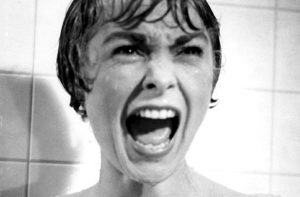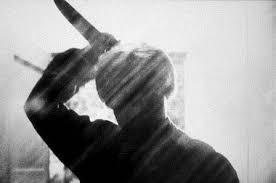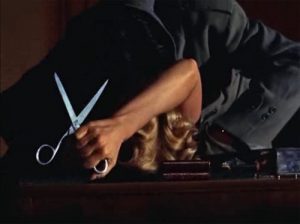It is complicated to find someone (over 40) who hasn’t seen Psycho, the film directed by Alfred Hitchcock in 1960, based on the homonymous novel by Robert Bloch. So I don’t think I am spoiling the ending (if you haven’t seen it yet, go on and then come back here and read the rest of this post).
Almost anybody knows the truth about “Psycho”. I do. I know it straight from the horse’s mouth! I have seen the film well over a hundred times (and I have also read the book). Hitchcock depicted mothers-in-law in general and his in particular when he showed Norman Bates’ Mother.
She is THE MOTHER-IN-LAW par excellence, the quintessence of the annoying non-blood relations, the embodiment of inveterate motherinlawness. Hitchcock never intended to make a thorough study of mental illnesses. That is a lie. He knew well the idiosyncrasy of that type (from his youth he had suffered a bullying mother-in-law who absolutely fitted in the malevolent canon that Lucifer started writing five minutes after he was cast out of Heaven and brought down to Hell –it was then when he changed his name to Demon, Devil or Satan).
Marion Crane is Hitchcock himself in a cinematographic disguise. He wanted to warn us all that a mother-in-law always represents the biggest threat, a lurking danger, a sword of Damocles (in this case, a butcher knife) hanging over our heads.
A mother-in-law, according to Hitchcock, that false and treacherous creature, never rests, although she masquerades as a caring second mother. Beware of this dangerously convincing Hydra. She will stab you in the shower the moment you drop your guard. So good old Alfred’s cinematographic skill is put at the service of the best of all causes: encourage people to marry orphans only. He aces a metaphor whose interpretation is not accessible to every mind: absolutely all mothers-in-law are cut from the same cloth. Not with scissors, but with a butcher knife, you must remember. Hitchcock changed the scissors for the butcher knife to add some brutality to the scene and because he had already used them back in Dial M for Murder (1954) –Grace Kelly killing her killer- so he didn’t want to repeat. But the main reason for the butcher knife was that the film marketing and publicity was paid by the Butchers’ Board of Trade of Pasadena (California).
What splendid life lessons cinema and literature provide us! If only we paid more attention…Of course you have to interpret them correctly or have a witty one who does it for you. DON’T WORRY: YOU HAVE ME, DESORBITADA! I volunteer my time and talent to unravel the misteries of the films and novels you like. First, I’ll do it for free –come on, guys, take advantage of this opportunity. We’ll discuss my remuneration in the future.
Thanks to my special ability to pierce the veil of the obvious I can expose what is hidden inside film frames or the sentences that make up a novel.
Please, don’t hesitate to contact me!